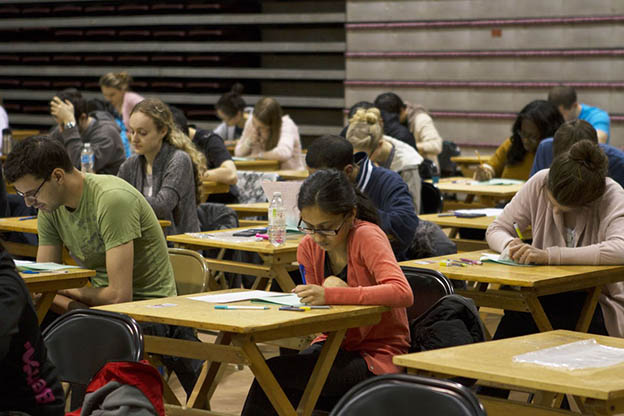Say goodbye to all-nighters by learning to study smarter, not harder

Breathe. Relax. Focus. Students put their study habits to the test in the Ivor Wynne Centre during last year's spring exam period. The Student Success Centre is offering a free Exam Skills Workshop on Friday, April 11. Students from all faculties are welcome to register through OSCARplus.
Most students know how to study hard. After all, you can’t get into a world-class university like McMaster without putting in the work.
But while cramming, study marathons and caffeine-driven all-nighters are often part of the student experience, studying smart will save time, reduce stress and ultimately be much more effective.
To help students prepare for the spring exam period, McMaster’s Student Success Centre is offering a free Exam Skills Workshop and top-five list of study tips to help you study smarter, not harder:
1. Limit study sessions and take breaks
Generally, most of us aren’t able to fully concentrate on one thing for a long period of time. In fact, the longer we try to study, the worse our focus and memory retention become. To avoid mental fatigue and maintain productivity, a good strategy is to limit the amount of time you spend focusing on one thing and to take short breaks. Experts recommend studying diligently for no more than 45-50 minutes at one time, and taking a 10-minute break before starting again. When you do this, you will refresh your brain, stay alert and lose less time to dreaded information overload.
2. Don’t (just) memorize
All exams will require some sort of memorization, but make sure to move beyond simply memorizing facts and definitions by digging deeper, asking questions and mastering the material. Finding themes, examples and connections between concepts will help you to understand and remember important ideas, and you can show true understanding by explaining concepts in your own words.
3. Test yourself
It’s easy to review lecture notes, understand the information and assume we know the material, but we often mistake recognition or familiarity for actual comprehension. A more effective strategy is to test yourself using cue cards, sample problems and potential exam questions. After studying a chapter, unit or theme, test yourself until you know the material. Continue occasionally testing yourself over the days leading up to the exam and you will improve your retention, memory retrieval and overall success.
4. Study with a purpose
Set a specific goal for each study session: What exactly will you accomplish in that session? What material will you be covering? Knowing exactly what you’re doing will keep you focused, motivated and organized, while also reducing the amount of time wasted.
5. Start with the tough stuff
We’re all tempted to stay comfortable by starting with what we know and moving onto more difficult material. The problem with this strategy is we often lose steam, and while our original intentions were good, our bodies don’t always cooperate. Your brain gets tired, and it’s better to focus on the tough stuff while you’re still awake. Start with what you don’t know and move on from there. You’ll end up learning the easy material along the way.
Jennifer Meister is the Academic Skills Program c0-ordinator at McMaster’s Student Success Centre.

